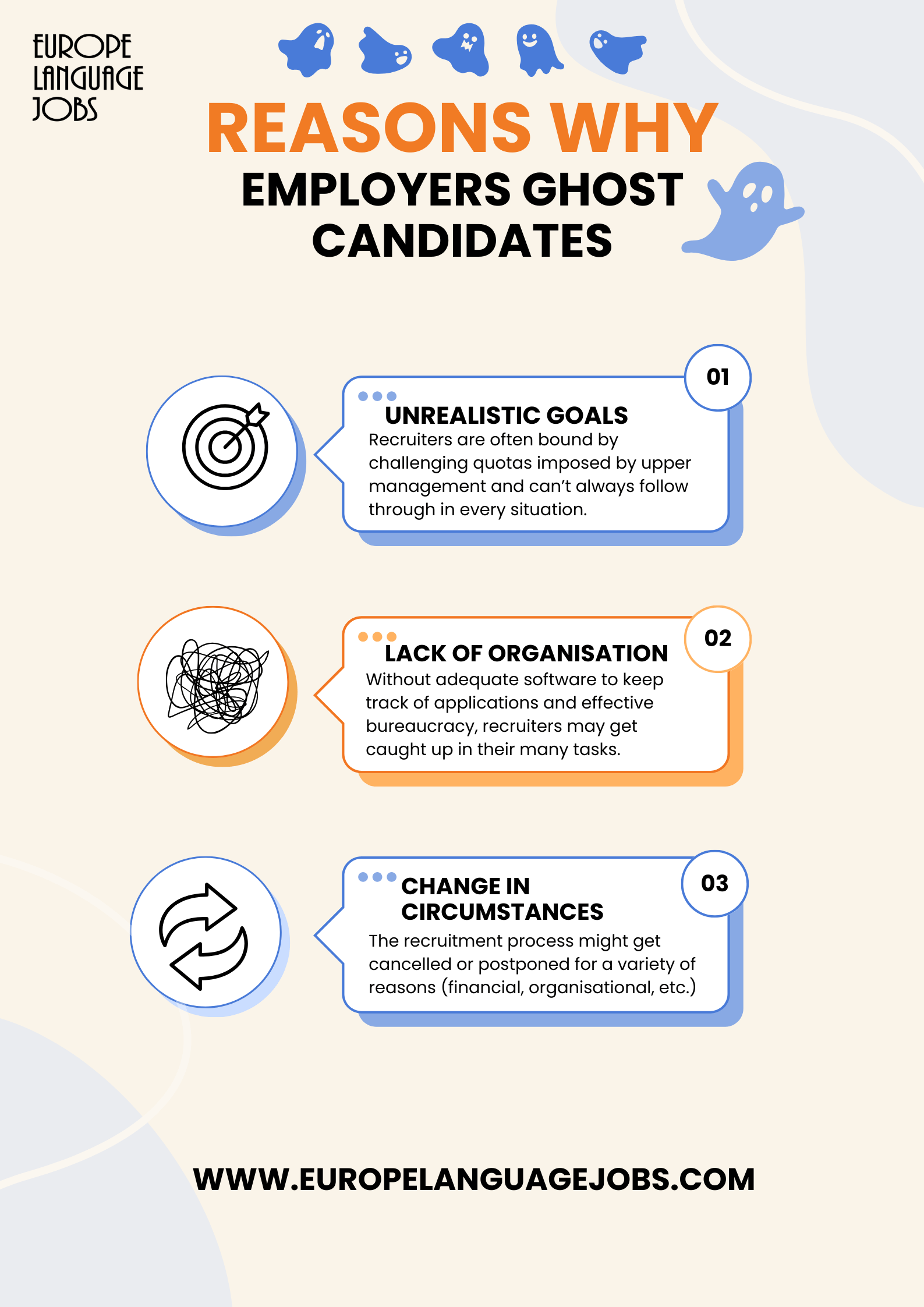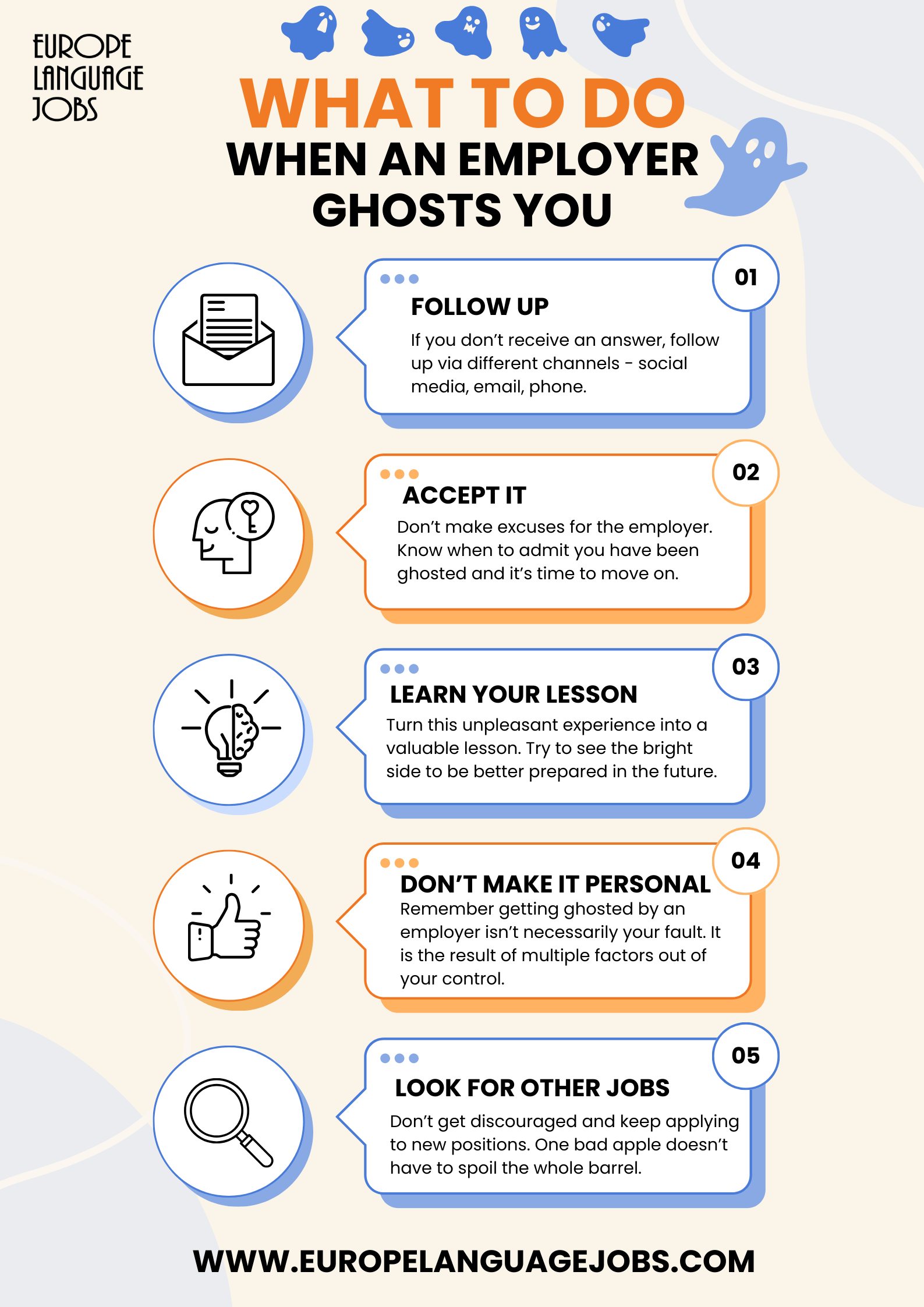In the spooky season, we are surrounded by ghosts, skeletons, and zombies. This time of the year, many of us are excited about scary faces glaring at us wherever we look. But not all ghosts are welcome - even on Halloween.
Ghosting has become a common tactic in various spheres of life - personal relationships, dating, and, unfortunately, job search. Research by Greenhouse revealed that 3 in 4 employees admitted to having been ghosted by an employer at some point in their career.
Getting ghosted is never a pleasant experience. Job search is hard enough as it is without having to worry about whether we will ever hear from the recruiter again after we have already established a relationship with them.
So, being ghosted by an employer can be a pretty big hit. The key to dealing with this harsh version of rejection is understanding why this had happened. And, ultimately, accepting that it is not necessarily your fault.
Now, before we explain possible reasons why employers ghost candidates, let’s first discuss how to tell if what you are experiencing is actually ghosting.
How do you know if an employer ghosts you?

Did you get ghosted by an employer or are you just impatient?
The first scenario which needs clarification is the expected waiting time when awaiting a response from a recruiter. How long you need to wait for feedback after an interview and information about the next steps majorly differs, depending on the size and structure of the company.
SMBs and start-ups are known to respond much quicker than huge multinational enterprises. First of all, they have fewer candidates to screen and fewer positions to fill.
International giants often run recruitment for dozens of vacancies at the same time. Despite the fact that they also have a bigger number of hiring managers at their disposal, sometimes, the numbers exceed their expectations.
Because of that, what you assumed was ghosting may simply be an extended waiting time. Remember that recruiters have to conduct interviews with all chosen candidates before they can proceed further. Even if they liked you, they can’t let you know until they have met with everyone.
We say that the optimal waiting time for SMBs and start-ups is up to one week. For multinational companies, it can take anywhere between two and three weeks.
A week up to a week and a half is a good time to follow up with a big enterprise. Pay attention to what you have been told about the timeline during your interview. It may be shorter or longer for every employer, and the recruiters ought to inform you how long you should expect to wait.

Did you get ghosted by an employer or was your application rejected?
There is a difference. Ghosting is when an employer stops responding after you have already established some kind of relationship. You either went to an interview, or had a conversation via email, phone, or social media.
So, when you are being ignored after participating in an interview, it is ghosting.
If you made plans to arrange an interview but never got a confirmation about the time or place, it is ghosting.
If you said you are potentially interested in pursuing a career opportunity and would like to receive more details but never did, it is ghosting.
If you submitted your application but never heard from anyone regarding it, it is not ghosting
.
Many companies reserve the right to contact only successful candidates - those they would like to invite to an interview. For others who didn’t make the cut, silence on the company’s end is usually an answer on its own.
This is especially true for large companies or extremely popular positions, which receive hundreds of applications. Recruiters simply don’t have the capacity to respond to every single person.
A lack of an answer may be perceived as rude, but we are all overworked these days, and the expectations placed on recruiters often leave them no choice. Remember that they are only the intermediaries between the candidates and the company’s management.
So, it is always a good idea to follow up once. If you don’t hear back for a significant amount of time, move on.
Now that we have established what constitutes ghosting and what does not, let’s examine possible reasons for being ghosted by an employer.
Reasons why an employer ghosts you


1. Unrealistic goals
Recruiters are busy people. They are often under a lot of pressure to meet quotas imposed by upper management. They are usually given certain goals to meet, such as the number of CVs they need to review and the percentage of candidates who have to be chosen for an interview.
Those numbers oftentimes exceed the capabilities of HR teams. Most of the time, they are looking to fill multiple positions at once. Additionally, conducting interviews and contacting candidates are not their only duties.
Recruiters have a long list of tasks to complete every day, and talking to applicants constitutes only a small fraction of them. When they are faced with having to prioritise their obligations, responding to every single message might not top their to-do list.
This is why your attempts to reach out may sometimes go unanswered. It is also the reason why following up is always a good idea. In case a stressed recruiter loses your message in the sea of others, popping it back up to the top might be your chance to be noticed again.
But realistically, this doesn’t always work, either. If recruiters are required to review too many CVs and interview too many people, a natural selection simply has to occur.
This is not your fault - merely the result of unrealistic expectations in this fast-paced world.

2. Lack of organisation
This is partially a byproduct of setting goals that are impossible to meet. When faced with too many tasks - and too much stress - we all tend to lose our wits.
Recruiters have to juggle dozens of vacancies and hundreds of candidates at the same time. Remembering who applied for what and when is only possible with an adequate ATS (Applicant Tracking System).
If a company uses software which doesn’t align with their needs or isn’t efficient enough, it is all too easy to make a mistake.
Of course, it is unlikely that serious employers will leave anything down to luck in this time and age. Recruitment processes are entirely managed digitally, but even with the help of technology, nobody is flawless.
One wrong click and boom - your name lands in the discarded pile instead of on the list of attractive candidates. Your contact details get mixed up. Your name gets overlooked among the many others in the database.
If you follow up, your chances of fixing such a slip-up increase. Remember to always state your full name and the position you applied for in your message. It might just be your ticket to your new job you might have otherwise waved goodbye.

3. Change in circumstances
The world keeps turning. Our circumstances change every day, and we all know all too well what it is like to wake up one day and discover your entire world has tilted on its axis.
Companies are no different. They are made of people, and people are dynamic. There are dozens of scenarios nobody could predict playing out every day, and it is not always possible to fix them straight away.
Therefore, if you get ghosted by an employer, it might be because something happened that affected the recruitment process. There are several options:
-
The recruitment process was closed and nobody was chosen for the position
-
The recruitment process was postponed
-
The company decided to hire someone internally and closed the external recruitment
-
A candidate the employer had previously known became available and accepted the job
Those are just some examples - the truth is, the possibilities are endless. It is not uncommon for a recruitment process to be delayed or closed altogether due to pay cuts, internal restructuring, department closing, or any other factor.
Oftentimes, recruiters can’t and won’t tell you about the reasons behind the decision. Even if you follow up, they might just ignore you, too busy putting out fires or adapting to a new way of working.
Again, in such a scenario, being ghosted by an employer is not your fault at all. To quote a classic: it eez what it eez.
This list of reasons why an employer ghosted you is not exhaustive. These are just some examples. The truth is, you will probably never find out why you got ghosted.
The point here is to understand that it is not necessarily your fault. Even if you did something wrong in the interview, you have the right to know about it.
A mistake on your side, no matter how big or small, is not an excuse for an employer to ghost you. None of us would grow without constructive feedback, so it is in good nature for a recruiter to share their advice regarding your performance and possible improvements.
So, don’t beat yourself up over getting ghosted by an employer. There is no point. Here is what you can do instead:
What to do when an employer ghosts you


1. Follow up
You would think “follow up” was the main targeted keyword of this article, at the frequency we use it. But the truth is, we don’t care about SEO rankings as much as we do about providing constructive advice.
Always follow up. Failing to follow up is giving up before you even tried. Now that you know the common reasons for being ghosted by an employer, you realise it may be due to a lack of organisation or too much work on the recruiter’s side.
Sending a follow-up is your way to ensure you did everything you could to get that job. And even if it fails, you can go to sleep knowing that you have nothing to accuse yourself of because you did your best.
Always send a brief thank-you note after every interview you attend. And if this doesn’t earn you a response, follow up a second time after a week or so. If there is still no answer, let it go.
It is important to know where to stop. Sending repetitive follow-ups might come off as desperate. If the first one didn’t solicit a reply, the chances are, the second, third, and fifth won’t, either.
In fact, the possibility you will receive an answer declines with every follow-up you send. So don’t overdo it. Send just one. If that doesn’t help, move on.
If an employer can’t even be bothered to reward your efforts with an answer - not even an impersonal, automatic email - then you probably don’t want to be part of such poor company culture, anyway.
Pro tip: if your initial follow-up doesn’t work, you can try contacting a recruiter in other ways. If you have been communicating via email, look for them on LinkedIn. If you only talked on LinkedIn, see if you can find their email address.
Following up via different channels is a handy trick. Technically, you only follow up once - just using different ways.

2. Accept it
Admitting you got ghosted by an employer is a bit like trying to get out of a toxic relationship. Our first instinct is often to make excuses for the employer.
Maybe they’re busy?
Maybe they are on holiday and forgot to tell me?
Maybe they discovered their office had been built on radioactive residue and they’re all in quarantine now, without access to their professional phone or email?
No.
It is time to face the music. Beware of “one more follow-up won’t hurt”. It will. It will hurt you.
And the worst thing? It will be you hurting yourself. It will keep building up hope when deep down, you already know it’s over.
Don’t turn into a masochist. No job is worth it - no matter the salary, the company name, or the benefits.
You have done everything you could. You crafted a perfect CV, wrote a killer cover letter, submitted your application on time, turned on the maximum level of charm in conversations, and sent a polite follow-up.
The ball is now in the employer’s court. If they don’t respect your effort enough to grace you with a reply, forget them. Begging someone like this to hire you is like repeatedly coming back to an abusive partner.
Saying no and moving on is hard, but it is the wise thing to do in this situation.

3. Learn your lesson
Remember that every negative experience in your life comes with a lesson. Even if you don’t see it right away, there is always something you can learn - even if said lesson is brutal.
In the case of being ghosted by an employer, the outcome could be that certain things are just out of our control. That even if we do our best, success is not always guaranteed. That you ought to respect yourself enough to be able to admit it is not your fault.
All of those lessons are brutal, that’s true. But what doesn’t kill you makes you stronger, and the next time it happens, you will be better prepared.
Now, we agree that it should not happen at all. We shouldn’t have to prepare for getting ghosted by an employer because such situations should not take place.
But as you have learnt from this article, not even multinational giants can predict everything. Circumstances can change, and an employer who ghosted you is not necessarily the villain. Sometimes, they are also a victim of some other issue they need to solve before they can start hiring again.
Remember that every employer is responsible for their employees. It is in their best interest to keep the company growing and ensure good working conditions for everyone.
If they can’t do it, suspending all recruitment is a lesser evil. Depending on the gravity of the situation, they might not always have the possibility to inform everyone of their decision and the reasons behind it.

4. Don’t make it personal
We have said it, and we will say it again: it is hardly ever a candidate’s fault for being ghosted by an employer. And never is it personal.
Chances are, if you got ghosted, multiple other candidates did as well. This can happen if the entire recruitment process was cancelled, or if someone was hired internally.
It is hardly your fault a position was closed down before it could fully open due to pay cuts. You could be the best candidate in the world and a perfect match for the role. But if the employer suddenly doesn’t have the money to hire you and cover your salary, you won’t be chosen. Nobody will.
No recruiter ever goes: "I don’t like this person, let’s ghost him or her". It is not vindictive, it is not malicious, and, most importantly, it is not personal. Most often, it is just the result of factors out of our control, making ghosted candidates victims of circumstance.
Don’t confuse being ghosted by an employer with being ghosted by someone in a personal relationship. Recruiters are professionals who cannot make decisions based on their prejudices or be judgemental. They will never ghost you because of you.

5. Look for other positions
Hopefully, you know better than to put all your eggs in one basket and place all your hope in only one position. While you shouldn’t apply to every single vacancy out there, you should always have alternatives.
If you start suspecting you have been ghosted by an employer and your follow-up attempts brought no results, move on. Review the status of your other pending applications and organise your job search.
Remove all the positions which are no longer active. Replace them with new ones which have opened up during the time you were invested in the one you got ghosted for. Keep track of your progress and methodically apply to new roles as they pop up.
The truth is that the vast majority of us have experienced employer ghosting at least once in our lives. The lucky few who haven’t yet should hope for the best but be prepared, just in case.
This is why we hope you found this guide explaining what to do when an employer ghosts you helpful. The biggest outcome is to never take it personally and not give up. It happens to the best of us, so there is no point losing sleep over it.
If finding a job is proving difficult, then why not broaden your horizons? When you feel stuck, it is a good idea to consider relocating.
At Europe Language Jobs, we make it easy by listing attractive positions with languages in various European countries. Visit our job board to find new opportunities waiting for you!
Feeling inspired? Visit our blog for more career advice! How can you be sure the information we provide is top-notch? We are a group of professionals working with recruiters, career coaches, and HR specialists from all over the world!
Trust our experience and let us help you find a new job in Europe!














Nesrin Hasanova1y ago
Wow! I learned so much from this article. Thank you!
Wow! I learned so much from this article. Thank you!